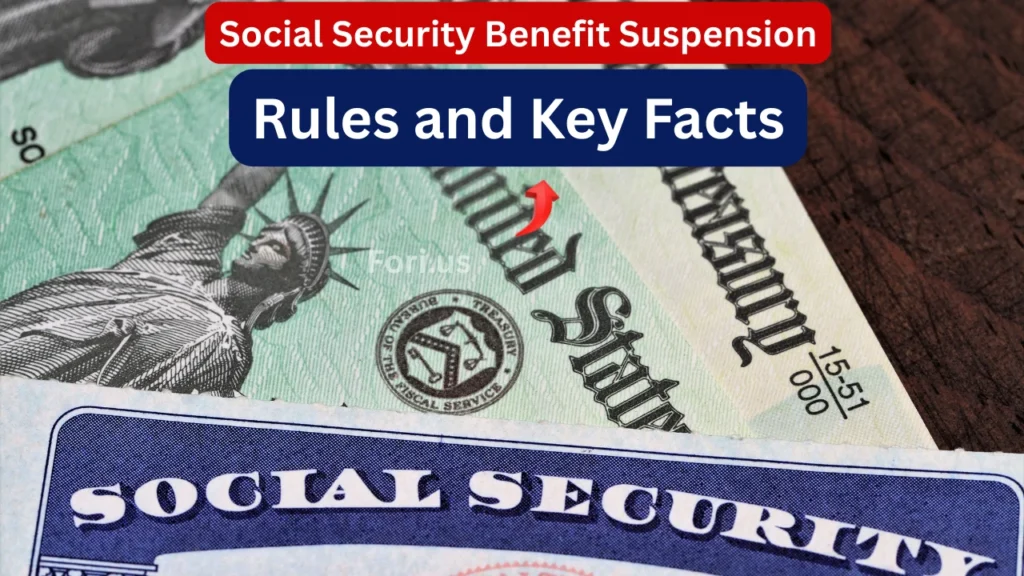Social Security serves as a primary source of income for countless Americans once they retire, helping them cover day-to-day expenses. The monthly amount you receive depends on when you start collecting your benefits. Beginning at 62 gives you smaller checks, while waiting until full retirement age (currently 67 for those born in 1960 or later) gives you the standard amount. If you hold off until 70, your monthly benefit is at its highest.
However, personal and financial situations can shift over time. Some people start claiming early because they need money immediately. Later, they may find themselves financially stable through work, investments, or inheritance and no longer need monthly checks. In such cases, the Social Security Benefit Suspension option allows them to pause payments in exchange for higher future benefits.
Capital One Settlement 2025: Payouts Incoming – Who Qualifies and How Much You Could Get

Social Security Benefit Suspension Highlights
| Eligibility | Must be at full retirement age (67 for most); under 70 |
| Benefit Increase | 8% credit added for each year benefits are suspended until age 70 |
| Suspension Start | Begins month after SSA receives the request |
| Application Method | Phone, written request, or in-person at SSA office |
| Impact on Family | Spousal and child benefits stop if based on your record |
| Medicare | Premiums billed directly instead of deducted from Social Security |
Understanding Social Security Benefit Suspension
A suspension means you tell the Social Security Administration (SSA) to pause payments after you’ve already started receiving them. During this period, you collect delayed retirement credits, which increase your benefit by about 8% for every year you wait, until you reach 70.
This option works well for people who started collecting earlier than planned but later realize they can afford to delay. By suspending, you give yourself the chance to lock in a larger check for the rest of your life.
Who Can Suspend Their Benefits?
Not everyone qualifies for suspension. The rules are strict:
- You must have reached full retirement age (currently 67 for most).
- You must be under 70; beyond that, you automatically receive the maximum benefit.
- If you began claiming benefits before full retirement age, you cannot suspend until you reach that milestone.
- An exception exists for those who started benefits less than 12 months ago—you can withdraw your claim instead, but you must repay what you already received.
WASPI Women Payouts 2025: Eligibility, Compensation Amounts, and Payment Dates
Steps to Suspend Your Social Security Benefits
Requesting suspension is simple. No special forms are required, and you can use one of several methods:
- Call the SSA – Speak directly with an agent to process your request.
- Submit a Written Request – Mail a signed statement to your local SSA office.
- Visit in Person – Go to your nearest office and provide your request face-to-face.
Once processed, your suspension starts the month after SSA receives it. Payments will automatically resume at age 70 unless you restart earlier.
Key Things to Know Before Suspending
Suspension can boost your future benefits, but it comes with trade-offs. Important factors include:
- Family Benefits: If your spouse or child receives benefits through your record, those payments will stop during suspension. However, an ex-spouse collecting on your record will not be affected.
- Your Other Benefits: If you receive payments based on someone else’s work record, those also stop.
- Supplemental Security Income (SSI): You cannot receive SSI while your retirement benefits are suspended.
- Medicare Part B Premiums: Premiums will no longer be deducted automatically; you will be billed directly. Missing payments could lead to loss of coverage.
Understanding these rules ensures you avoid unexpected financial issues during the suspension period.
Nationwide Bank Customers Getting £375 Bonus Directly
Why People Choose Benefit Suspension
Several reasons drive people to pause their Social Security benefits:
- Higher Future Payments: Each year of suspension adds delayed credits, giving you a stronger monthly income later.
- Improved Financial Stability: If you return to work, receive an inheritance, or grow other income sources, you may not need Social Security right away.
- Better Retirement Planning: Some choose suspension to coordinate with a spouse’s benefits or manage household income more strategically.
For many, the decision is about long-term financial security rather than immediate relief.
Illustration of Benefit Suspension in Action
Consider John, who began collecting Social Security at 67 but later decided to suspend at 68. His benefit increased by about 8% for every year of suspension. By the time he turned 70, his check was around 24% larger than what he originally received.
For someone living well into their 80s or 90s, that increase adds up to thousands of dollars in extra lifetime income.
Driving Rules USA 2025: New Laws, Speed Limits & Fines
FAQs About Social Security Benefit Suspension
It is the process of pausing your retirement payments to earn delayed credits that increase future benefits.
Only after reaching full retirement age but before turning 70.
About 8% for every year you delay, until age 70.
Spousal and child benefits tied to your record stop until you restart payments.
Yes, you can request SSA to resume payments anytime before 70.
The Social Security Benefit Suspension option is a valuable tool for retirees who want flexibility and larger future payments. While it can help maximize your long-term income, it also comes with important consequences for your family and healthcare coverage.
Before making a decision, it’s wise to review your finances, consider household needs, and speak with SSA or a financial advisor. Understanding the rules ensures that you make the choice that best supports your retirement goals.
